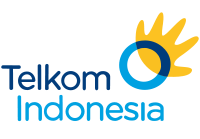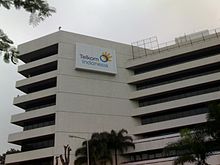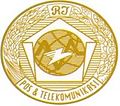- Telkom Indonesia
-
Telkom Indonesia 
Type Public company Traded as NYSE: TLK
LSE: TKID
IDX: TLKMIndustry Telecommunications Founded October 23, 1856[1] Headquarters Telkom Japati,
Bandung, IndonesiaKey people Rinaldi Firmansyah (CEO) Services Fixed line
Mobile telephony
Internet services
TelevisionRevenue  US$ 7.888 billion (2010)[2]
US$ 7.888 billion (2010)[2]Net income  US$ 1.326 billion (2010)[2]
US$ 1.326 billion (2010)[2]Total assets  US$ 11.466 billion (2010)[2]
US$ 11.466 billion (2010)[2]Total equity  US$ 5.105 billion (2010)[2]
US$ 5.105 billion (2010)[2]Employees 21,000 (March 2011)[3] Subsidiaries List- Telin
Telkomsel
TelkomVision
Infomedia
Mitratel
Pramindo
Multimedia Nusantara
Graha Sarana Duta
Telkomsigma
Finnet
Napsindo
Website www.telkom.co.id PT Telekomunikasi Indonesia, Tbk (NYSE: TLK, LSE: TKID, IDX: TLKM), commonly abbreviated as Telkom Indonesia or just Telkom, is the largest telecommunications services company in Indonesia. Telkom is a semi-privatized, majority state owned multi-listed company.[4]
Telkom Indonesia is the telecommunication business unit mainly in fixed line telephony, internet and data communications. It is also the parent company of the Telkom Group, which is engaged in a broad range of businesses that consist of telecommunication, multimedia, property and finance services.[4] Since 2008, Telkom Indonesia began transforming its business focus, infrastructure, systems, organization and human resources, as well as the corporate culture, as their effort faced rising competition.[5][6]
Telkom Indonesia currently employs about 21,000 people and has a combined total of approximately 125 million customers at end of April 2011 increased by 14.6 percent from 2010, making the company the nation's largest telecommunication service provider by subscribers.[3][7][8]
Contents
History
Telkom is one of the world's oldest telecommunication company. The company traditionally traces its roots to an establishment of the first first electromagnetic telegraph service in Indonesia on October 23, 1856 by the Dutch Colonial Government connecting Batavia (Jakarta) and Buitenzorg (Bogor).[9] In 1884, the Dutch Colonial Government founded a private company to provide postal and domestic telegraph services and, later on, international telegraph services.[10]
Colonial Era
Telephony services had been introduced to Indonesia in 1882 by privately-owned companies under a 25-year government license. In 1906, all postal and telegraph services in Indonesia were taken over by the government as single, unified government agency named Posts Telegraafend Telefoon Diensts (PTT).[9][11] In September 1945, roughly a month after Indonesian proclamation of independence, the agency headquarters in Bandung were taken over by Indonesian nasionalist.[11] In December 1949, after years of national revolution war, the PTT was nationalized by Indonesian Government as part of Indonesian effort to ousted the remaining Dutch and nationalized Dutch corporate assets.[12][13]
State-Owned Company
In 1961, PTT was converted from an official government agency into a newly-established state-owned company, the Postal and Telecommunications Services company.[14] Four year later, in 1965, Indonesian Government separated this company into two state-owned companies, PN Pos Giro responsible for providing mail services and PN Telekomunikasi as telecommunications services.[14] The mail services PN Pos Giro developed over year, to become the Pos Indonesia in 1995, which is still state-owned today and the official postal carrier for Indonesia's 230 million people.[11][14]
In 1974, PN Telekomunikasi was further divided into two state-owned companies. Perusahaan Umum Telekomunikasi (Perumtel) provided domestic and international telecommunications services, while PT Industri Telekomunikasi Indonesia (PT INTI) manufactured telecommunications equipment.[9] A further division in 1980 saw the international telecommunications business taken over by the newly established PT Indonesian Satellite Corporation (Indosat).[9]
In 1991, Perumtel became a state-owened limited liability corporation and renamed to what is now Perusahaan Perseroan (Persero) PT Telekomunikasi Indonesia or Telkom.[9] Until 1995, Telkom's operations were organized along twelve regional operating units known as Wilayah Telekomunikasi or Witel. Each Witel had full responsibility for all aspects of business and operations in their respective regions, such as telephone services, property management and security.[9] In 1995, Telkom reorganized the twelve Witels into seven regional divisions and one network division. Under a series of Cooperation (KSO) Agreements, Telkom transferred the right to operate five of its seven regional divisions (I, III, IV, VI and VII) to private sector consortia. Under these agreements, the KSO partners manage and operate the regional division concerned for a fixed term, build a specified number of fixed lines and, at the end of the term, transfer the telecommunications facilities to Telkom for an agreed amount in compensation. Revenues from the KSO operations were shared between Telkom and the KSO partners.[9]
On November 14, 1995, Telkom shares went on sale through an initial public offering on the Jakarta Stock Exchange and the Surabaya Stock Exchange (which merged in December 2007 to become the Indonesia Stock Exchange). Telkom's shares are also listed on the NYSE and the LSE in the form of American Depositary Shares (ADSs), and were publicly offered without listing on the Tokyo Stock Exchange. Telkom is now the largest company by market capitalization in Indonesia, with a market capitalization of approximately IDR 190,512 trillion as of December 31, 2009.[9][15] The Government retains an aggregate interest of 52.47% of the issued and outstanding shares of Telkom. The Government also holds one Dwiwarna share, which has special voting and veto rights over certain matters.[9][16]
In mid 1997, Indonesia was badly affected by the Asian economic crisis.[9][17] Among those impacted were certain KSO partners, who experienced difficulties in fulfilling their obligations to Telkom. Telkom eventually acquired control of its KSO partners in Regions I, III and VI, and amended the terms of the KSO agreements with its KSO partners in Regions IV and VII to obtain legal rights to control the financial and operating decisions of those regions.[9]
Telecommunication Deregulation
In 1999, Indonesia passed a deregulating telecommunication law that set in motion a sweeping array of reforms and enlivened competition policy, private investment, and long term industry direction.[17] Among the proposed reforms was the progressive elimination of the joint ownership, by Telkom and Indosat, of most of the telecommunications companies in Indonesia. This was intended to promote a more competitive market. As a result, in 2001, Telkom acquired Indosat's 35.0% stake in Telkomsel, resulting in Telkom owning 77.7% of the shares of Telkomsel, while Indosat acquired Telkom's 22.5% interest in Satelindo and its 37.7% stake in Lintasarta. In 2002, Telkom sold 12.7% of Telkomsel to Singapore Telecom Mobile Pte Ltd (SingTel Mobile), reducing Telkom's ownership of Telkomsel to 65.0%.[9]
On August 1, 2001, the Government terminated Telkom's exclusive right to provide fixed line services in Indonesia and Indosat's right to provide international direct dial services. Subsequently, Telkom's exclusive rights to provide domestic and long-distance services were terminated in August 2002 and August 2003, respectively.[9][18]
On June 7, 2004, Telkom began to provide their own international direct dial fixed line services. On November 16, 2005, Telkom launched Telkom-2 Satellite to replace all satellite transmission services that have been served by previous satellite, Palapa B-4.[9][19]
Transformations
In 2009, Telkom started doing the business transformation of the only company in the field of telecommunications to broader range of business, the company expanded to the telecommunications, information technology services, media and edutainment.[20] Telkom's decision to transform its business was prompted by the shift in customer lifestyles, and supported by advances in technology and regulatory changes that enabled service providers to deliver enhanced service to customers.[21] With this new business transformation, Telkom also plans to conduct the acquisition of several companies that are in line with Telkom’s transformation of the new business.[20][22][23]
Operations
Telkom Indonesia is a dominant and largest provider of fixed line services due to owning most of Indonesia's copper network.[4] Telkom also runs telephone exchanges, trunk network and local loop connections for its fixed-line telephones. Currently Telkom is responsible for approximately 8.3 million telephone lines in Indonesia.[4] And like most of the other state-ownership telecommunication company in the world, Telkom is obliged to provide public services such as public call boxes.
Telkom Indonesia businesses are operated under government regulation by the Indonesian Ministry of Communication and Information. Telkom, as government-owned company, is required to comply with additional obligations such as provide telecommunication services and not to discriminate. As well as providing service in those regulated areas, Telkom has expanded into more profitable products and services where there is less government-owned-related regulation.[24]
Telkom Indonesia is the parent company of the Telkom Group, which is engaged in a wide range of businesses that consist of telecommunication, information, multimedia, property and finance services.[4] Telkom mainly operates in fixed line telephony, internet and data communications business, while other businesses are run by subsidiaries.
Business Divisions
Telkom Indonesia is organised into following business divisions:
- Consumer Division: Retail telecoms services to consumers
- Carrier and Interconnection Services Division: Telecoms services partnership
- Enterprise Division: Telecoms services to enterprises
- Business Services Division: Telecoms services to small-medium businesses
- Telkom Flexi Division: Mobile phone services based on CDMA protocol
Subsidiaries and Investments (Telkom Group)
- Telin (Telekomunikasi Indonesia International): International telecommunications services and investment company
- Telkomsel: Mobile phone services based on GSM and UMTS protocol
- Infomedia Nusantara: Information & communication services solution
- TelkomVision: Subscription-based direct broadcast satellite, cable and IPTV television services
- Multimedia Nusantara: Strategic investment and holding company
- Telkomsigma: IT solutions, consulting services and data center
- Finnet: Financial services
- Mojopia: Internet commerce business
- Melon Indonesia: Music and entertainment business
- Admedika: Healthcare network provider
- Graha Sarana Duta: Property development and management company
- Pramindo: Joint operation scheme
- Scicom: Global CRM consulting, technology services, education and outsourcing company
- Mitratel: Telecommunication coverage provider
- Napsindo: Marketing business solution
Other investments:
- Patrakom: Strategic IT and telecommunications solutions
- Bangtelindo: Telecommunication planning, construction, installation and maintenance company
- Pasifik Satelit Nusantara: Satellite telecommunications company
- Citra Sari Makmur: Satellite and terrestrial network company
Corporate affairs
Logo
Awards
In July 2011, Telkom wons five awards from Finance Asia magazine for:[25]
- Asia's Best managed Company
- Best Corporate governance
- Best Investor Relations
- Best Corporate Social Responsibility
- Most Committed to a Strong Dividend Policy
See also
References
- ^ "Telkom Indonesia's profile page". http://www.indonesia.go.id/in/bumn/pt-telekomunikasi-indonesia-tbk.html. Retrieved August 12, 2011.
- ^ a b c d "2010 Annual Report PT Telekomunikasi Indonesia, Tbk" (Press release). Telkom Indonesia. http://www.telkom.co.id/download/File/UHI/Tahun2011/AnnualReport/AR_2010_EnglishF.pdf. Retrieved March 29, 2011.
- ^ a b "600 Karyawan Telkom Bakal Pensiun Dini Tahun Ini". March 12, 2011. http://www.inilahjabar.com/read/detail/1314572/600-karyawan-telkom-bakal-pensiun-dini-tahun-ini. Retrieved August 13, 2011.
- ^ a b c d e "Company Profile". Telkom Indonesia. http://www.telkom.co.id/investor-relation/company-profile/index.html?lid=en. Retrieved August 12, 2011.
- ^ "A Sleeping Giant Awakens: Telkom’s Reinvention". The Jakarta Globe. http://www.thejakartaglobe.com/business/a-sleeping-giant-awakens-telkoms-reinvention/392474. Retrieved August 12, 2011.
- ^ "PT Telekomunikasi Indonesia Corporate Transformation". http://www.telkom.co.id/UHI/sr-en/02_transfomation/0100_corporate.html. Retrieved August 12, 2011.
- ^ "Company Info". Telkom Indonesia. http://www.telkom.co.id/company-info/index.html?lid=en. Retrieved August 12, 2011.
- ^ "Total 100 Million Customers Translucent Telkomsel". http://www.gadgetphones.net/1353/total-100-million-customers-translucent-telkomsel/. Retrieved August 12, 2011.
- ^ a b c d e f g h i j k l m n "History of TELKOM". Telkom Indonesia. http://www.telkom.co.id/UHI/assets/pdf/EN/09_Corporate%20Data.pdf.
- ^ "TELKOM in Brief, History of the Company". Telkom Indonesia. http://www.telkom.co.id/download/File/UHI/SR/TELKOM_SR2009.pdf.
- ^ a b c "(Indonesian)Sejarah Pos Indonesia". http://www.posindonesia.co.id/profile.php?id=2. Retrieved August 13, 2011.
- ^ "Dutch enterprise in independent Indonesia: cooperation and confrontation, 1949-1958". IIAS Newsletter #36. March, 2005. http://www.iias.nl/nl/36/IIAS_NL36_18.pdf. Retrieved August 13, 2011.
- ^ "(Indonesian)Telkom Indonesia". http://elib.unikom.ac.id/files/disk1/484/jbptunikompp-gdl-asepsandyn-24180-1-unikom_a-i.pdf. Retrieved August 13, 2011.
- ^ a b c "Indonesia -- Pos Indonesia". Consumer Postal Council. http://www.postalconsumers.org/postal_freedom_index/Indonesia_--_Pos_Indonesia.shtml. Retrieved August 13, 2011.
- ^ "State companies control 26% stock market capital". Antara News. December 31, 2010. http://www.antaranews.com/en/news/1293798817/state-companies-control-26-pct-stock-market-capital. Retrieved August 13, 2011.
- ^ a b Ken Zita. "Indonesia Telecom Brief". Network Dynamics Associates LLC. http://www.ndaventures.com/Indonesia_Telecom_Brief.pdf.
- ^ "Regulatory Multiplicities in Telecommunications Reforms in Indonesia and China". MqJBL. 2005. http://www.accg.mq.edu.au/docs/publications/past_editions/volume_2/6.young_etc-1.pdf. Retrieved August 13, 2011.
- ^ "Telkom-2". Orbital. http://www.orbital.com/satellitesspace/communications/telkom/. Retrieved August 13, 2011.
- ^ a b "Business Transformation, Telkom Corporate Shoot 6500 Companies". Refishowcase. http://refishowcase.com/company-info/business-transformation-telkom-corporate-shoot-6500-companies.html. Retrieved August 13, 2011.
- ^ "Corporate Transformation". http://www.telkom.co.id/UHI/sr-en/02_transfomation/0100_corporate.html. Retrieved August 13, 2011.
- ^ "Telkom Business Transformation". http://www.telkom.co.id/media-corner/press-release/new-identity-marked-telkom-business-transfromation.html. Retrieved August 13, 2011.
- ^ "We are transforming, Our Business is TIME". http://www.telkom.co.id/investor-relation/company-profile/fact-sheet/. Retrieved August 13, 2011.
- ^ "(Indonesian)Tinjuan Industri Telekomunikasi di Indonesia". Telkom Indonesia. March 31, 2010. http://www.telkom.co.id/UHI/assets/pdf/ID/03_Tinjauan%20Industri.pdf. Retrieved August 14, 2011.
- ^ "Telkom Wins Five Awards from Finance Asia". Juli 2011. http://www.antaranews.com/en/news/74226/telkom-wins-five-awards-from-finance-asia.
External links
Rinaldi Firmansyah (CEO)Subsidiaries Telin · Telkomsel · TelkomVision · Infomedia · Mitratel · Pramindo · Multimedia Nusantara · Graha Sarana Duta · Telkomsigma · Finnet · NapsindoJoint ventures, affiliates, and investments Scicom · Patrakom · Bangtelindo · Pasifik Satelit Nusantara (PSN) · Citra Sari Makmur · Batam Bintan TelekomunikasiProducts and services TelkomFlexi · Flexinet · TelkomSpeedy · TelkomselFlash · simPATI · Kartu Halo · Kartu AS · Groovia TV · YesTVMiscellaneous Annual Revenue:  US$ 7.888 billion USD (2010) · Employees: 21,000 (2011) · Stock Symbols: NYSE: TLK, LSE: TKID, IDX: TLKM · Website: www.telkom.co.idCategories:
US$ 7.888 billion USD (2010) · Employees: 21,000 (2011) · Stock Symbols: NYSE: TLK, LSE: TKID, IDX: TLKM · Website: www.telkom.co.idCategories:- Companies listed on the New York Stock Exchange
- Companies listed on the London Stock Exchange
- Companies listed on the Indonesia Stock Exchange
- Telkom Indonesia
- Public utilities
- Government-owned companies in Indonesia
- Internet service providers of Indonesia
- Telin
Wikimedia Foundation. 2010.





